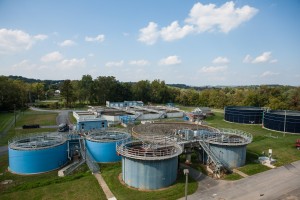RETTEW’s expert staff has helped two local municipal water authorities to achieve outstanding results at their wastewater treatment plants. Both plants recently underwent upgrades to meet more stringent limits imposed by the Chesapeake Bay Tributary Strategy. The Pennsylvania Department of Environmental Protection (DEP) required the wastewater treatment plants to complete upgrades for new nitrogen and phosphorous limits, 6.0 ppm and 0.8 ppm, respectively.
In Manheim Borough, Lancaster County, RETTEW designed upgrades to the wastewater treatment plant owned and operated by the Manheim Borough Authority. RETTEW evaluated their existing operations and then completed the design and permitting required for the proposed upgrades. We also provided construction administration services to see the upgrades through to completion. An extremely challenging site, the changes were completed without encroaching on green space by retrofitting the standing 40-year-old facility and its existing footprint. RETTEW assisted in securing a $4.3 million grant, reducing the costs that would be passed on to local customers because of the increased treatment abilities.
Technical services provided to achieve the improvements included designing an oxidation ditch with an anaerobic selector to biologically remove phosphorous and nitrogen from the wastewater; two chemical feed systems to give operators the ability to feed a supplemental carbon source to aid in the removal of nitrogen and to chemically aid in the removal of phosphorous by precipitation; and adding and upgrading existing final clarifiers. Other design improvements included a new sludge storage building and incorporating post-lime stabilization to help achieve a future Class A Biosolids designation.
Challenges arose during construction, including excessive groundwater causing torrents of water to stream through the construction site. RETTEW and the contractor developed dewatering techniques that would not only keep the construction area dry but would avoid sediment discharge to the adjacent creek.
RETTEW helped the authority to devise operating procedures to achieve high levels of efficiency. To date in 2013, the wastewater treatment plant has achieved phosphorous and nitrogen levels at less than half of those required by the DEP. If more stringent regulations go into effect in the future to continue supporting the Chesapeake Bay cleanup, the authority should already be equipped to meet such standards, possibly eliminating the need for additional costs associated with further upgrades. The American Council of Engineering Companies of Pennsylvania chose this project for an Honor Award in the water and stormwater category.
In Highspire Borough, Dauphin County, the local authority also tackled the Chesapeake Bay Strategy and worked with RETTEW to design the improvements. RETTEW followed similar steps of analyzing, design, and construction administration to ensure the success of the upgraded facility. Our team secured a $5 million grant and worked with the authority to keep the existing plant running while upgrades were completed.
Challenges also arose in Highspire during construction, including contaminated soils and unmarked underground tanks not shown on drawings. RETTEW worked with the DEP to develop a plan for capsulating the soils, which eliminated the excessive costs of hauling and offsite disposal.
The upgrades resulted in HIghspire’s ability to meet the required discharge limits. In fact, Highspire was one of the state’s lowest dischargers of nitrogen in 2012.
These two projects illustrate that with the right technology, expertise, and dedication, municipalities across the Commonwealth can successfully upgrade their wastewater treatment plants to exceed regulations while keeping costs in check.
“We enjoy working closely with our clients to find the perfect solution for them,” said Yves Pollart, RETTEW vice president. “And it’s especially important to us as a firm to help improve the communities we live and work in, as well as protect the environment. These projects are great examples of both.”
